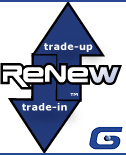Back to the Basics: Communication Devices
Since today's communication technology
can be confusing for many people, Genesis Global, Inc. wants
to go back to the basics and take a brief look at the
various types of communication channels available. This
article addresses eight basic factors which affect data
transmission: "transmission rate—frequency and bandwidth;
line configurations—point-to-point versus multipoint; serial
versus parallel transmission; direction of
transmission—simplex, half-duplex, and full-duplex;
transmission mode—asynchronous verses synchronous; packet
switching; multiplexing; and protocols."
Transmission Rate—Frequency and Bandwidth
Frequency: Transmission rate (or
speed) of information traveling through a channel can be
effected by wave frequency. For example, twisted-pair
telephone wires, coaxial cables, and fiber-optic cables are
channels that send data at different speeds due to their
different wave frequencies.
Bandwidth: Bandwidth is a channel that can send
several speeds of frequency all at the same time. The more
bandwidth there is, multiple frequencies of data can be
transported at a faster speed. “The rate of speed of data
through the channel is expressed in bits per second (bps),
kilobits per second (Kbps), or megabits per second (Mbps).”
Line Configurations—Point-to-Point vs. Multipoint
Point-to-Point: “A point-to-point
line directly connects the sending and receiving devices,
such as a terminal with a central computer.” This method
keeps data private and secure since data is transmitted from
one device to another. A router connected to a PC is a
simple example of a point-to-point connection.
Multipoint: “A multipoint line is a single line
that connects several communications devices to one
computer.” For instance, one line of coaxial cable can
transmit data to three or more routers.
Serial vs. Parallel Transmission
Serial: Bits of data travel
through channels sequentially—one bit of data follows the
next (as in the case of twisted-pair telephone lines). This
is equivalent to cars moving down a one-lane road, one
behind the other.
Parallel Transmission: Bits of data “are
transmitted through separate lines simultaneously. The
arrangement resembles cars moving in separate lanes at the
same speed on a multilane freeway.”
Direction of Transmission—Simplex, Half-Duplex, and
Full-Duplex
Simplex: When two computers are
in communication, data can flow through a channel in only
one direction. For example, the traditional television only
sends information out.
Half-Duplex: When two computers are in
communication, data can flow in both directions. CB and
marine radios can send and receive information, but not at
the same time.
Full-Duplex: When two computers are in communication,
data can flow in both directions at the same time as seen in
telephone conversations.
Transmission Mode—Asynchronous vs. Synchronous
Asynchronous: (also called
start-stop transmission) In this mode, data is sent one byte
(or character) at a time. "Each string of bits making up the
byte is bracketed, or marked off, with special control bits.
That is, a "start" bit represents the beginning of a
character, and a "stop" bit represents its end."
Synchronous: (timed transmission) "Instead of
using start and stop bits, synchronous transmission sends
data in blocks. Start and stop bit patterns called sync
bytes, are transmitted at the beginning and end of the
blocks. These start and end bit patterns synchronize
internal clocks in the sending and receiving devices so that
they are in time with each other."
Packet Switching Messages: are broken or divided
into packets when sent and pieced back together to form the
original message within a network. This is not suitable for
real-time video and voice transmission.
Multiplexing: Multiplexing allows a single
communications line to carry multiple signals at the same
time. For example, trunk networks transmit thousands of
telephone calls on a single line at the same time.
Protocols: Protocols are the rules that govern
the exchange of information between software and/or hardware
in a communications network.

To conclude, communication technology
does not have to be confusing. As technology continues to
evolve through time, so does our language. By expanding your
technical vocabulary, you will be able to make more informed
decisions on network hardware and network peripherals.
Occasionally reviewing these basic terms, helps us to be
more aware of the different data channels required for
communication devices.
About Genesis Global's Author: |
|
Debbie Jensen, an expert writer
for business and technology for Genesis Global, has a
Bachelor's Degree in Visual Communication (Multimedia). With
her twenty year history of creative expressions and
formalized study of Information Technology of digital
print/web design and development, she is now publishing
articles about networking for Genesis Global. |
|
Give Genesis Global's Account Sales Managers a call
at:
1-800-908-9665
The Best Business Connection
"Cisco believes the network is the
platform for organizations to connect with their
constituents and for individuals to connect with each
other," said Dan Scheinman, senior vice president and
general manager of the Cisco Media Solutions Group" (CMSG).
Used Cisco Hardware
Used Cisco Accessories
Used EqualLogic
Used Foundry
Used Juniper
Used Brocade
Used Marconi
Used 3Com
Used Riverstone
Used Nortel
Used 3Com
Call 1-800-908-9665 and our Sales Accounts Managers and
about ReNew!
|
|

|

